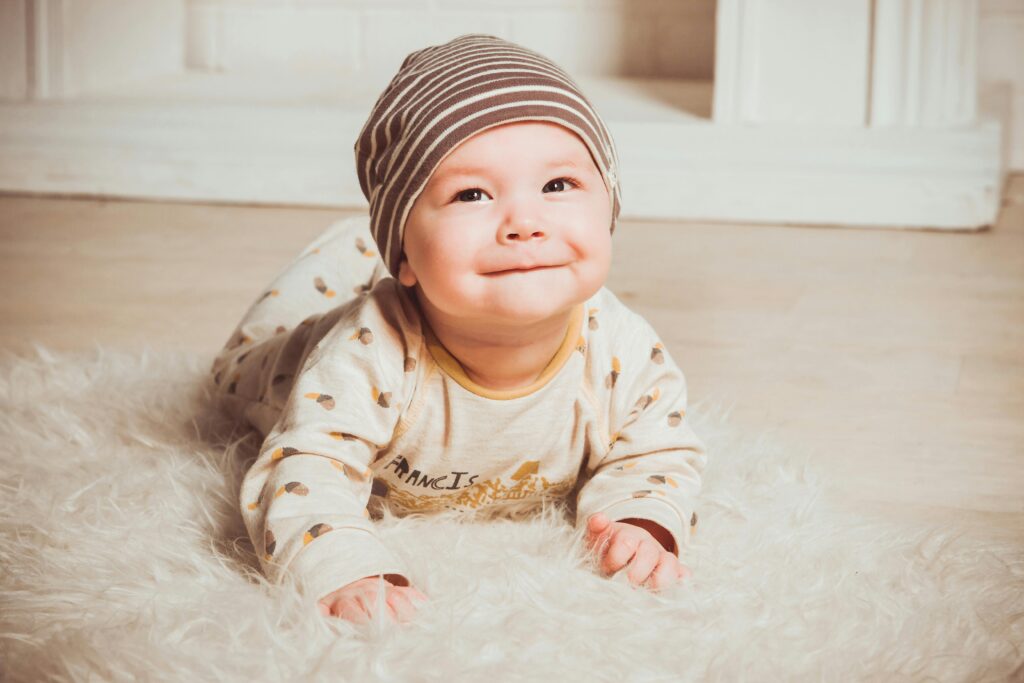We rely on affiliate links to keep Parent Circle running and full of helpful content. If you click and buy, we may earn a small commission — at no extra cost to you. Thanks for your support!
When my son was about seven months old, I noticed him shaking his head back and forth — almost like he was saying “no” to the air. At first, it was adorable and funny. But after a few days of seeing it more often, that little seed of worry started growing in my chest. Was it normal? Was something wrong? I remember sitting on the floor, Googling frantically with him in my lap.
If you’re noticing the same thing, you’re not alone — and it’s so normal to feel a little anxious. Here’s what helped us understand and navigate this phase, and what might help you too.
They’re Learning New Movements
What helped us was realizing that babies love exploring their bodies. Around 6 to 9 months, babies are mastering all kinds of movements — waving, clapping, and yes, shaking their heads.
- Head shaking can simply be a new “trick” your baby discovered.
- It often happens when they’re excited, tired, or even just experimenting.
- Some babies find the movement soothing or funny.
For us, it was just another adorable milestone on the journey to more coordinated movement.
(This worked for us, but every baby is different — if you’re ever unsure, don’t hesitate to check with your pediatrician.)
It Can Be a Form of Communication
Sometimes, babies shake their heads to “talk” before they have the words.
- Your baby might be trying to say “no” or express excitement.
- It can be a playful, attention-getting move (especially if it makes you laugh!).
- It’s often part of their developing social skills.
Once we realized our son was doing it when he was tired or resisting a nap, it clicked: he was communicating in the only way he could!
It Might Be a Self-Soothing Behavior
Another thing that helped us understand was seeing head shaking as a comfort tool.
- Some babies rock, suck their thumb, or shake their heads to calm down.
- Repetitive movements can help them regulate big feelings, especially when they’re overstimulated.
We noticed our baby would shake his head more when he was winding down for sleep. It was his way of finding his own little rhythm.
(Just sharing what helped us — always trust your gut and reach out to your doctor if something feels off.)
Keep an Eye on Context
While head shaking is usually harmless, watching when and how they do it can be important.
- If your baby is smiling, playing, or babbling while shaking their head, it’s usually fine.
- If it’s paired with unusual behaviors like lack of eye contact, developmental delays, or seems obsessive, it’s worth mentioning to your pediatrician.
- Trust your instincts — you know your baby best.
For us, context was everything. When we zoomed out and looked at the whole picture, it was clear our little guy was thriving and just having fun.
When to Talk to Your Pediatrician
It’s always okay — and smart — to check in if you’re worried.
- Mention it if head shaking is constant, intense, or combined with concerning behaviors.
- Talk to your pediatrician if you notice other red flags like regression in skills, avoiding eye contact, or stiffness.
Our pediatrician reassured us that our son’s head shaking was just part of normal development, but she was so kind and supportive about checking thoroughly. And honestly, just hearing that gave us so much peace of mind.
FAQs About Baby Head Shaking
Is it normal for my baby to shake his head when excited?
Yes! Many babies shake their heads when they’re happy, playful, or trying to interact with you.
Could it be a sign of something serious?
Sometimes, repetitive movements can indicate underlying concerns, but often it’s just a normal part of motor development. If you’re worried, definitely reach out to your pediatrician.
My baby only shakes his head when falling asleep — is that okay?
Absolutely — many babies use rhythmic movements like head shaking to self-soothe before naps or bedtime.
Should I stop my baby from shaking his head?
If it’s not hurting him and he seems happy, there’s no need to stop it. Redirect gently if it seems tied to overstimulation.
When should I be concerned?
Reach out to your pediatrician if you notice other developmental concerns, lack of social interaction, or very frequent/intense shaking.
Conclusion
Seeing your baby shaking his head can be a little nerve-wracking at first — but in most cases, it’s just another sweet part of their learning journey. Remember: you know your baby best, and you’re doing an amazing job noticing and caring for all the little things.
If you’re ever in doubt, it’s always okay to check in with your pediatrician. And if this stage is just part of their discovery, try to soak in these adorable moments — they pass quicker than we think.
Have you gone through this phase too? I’d love to hear your story in the comments! 💬








